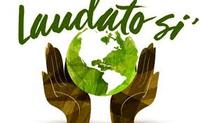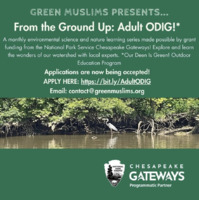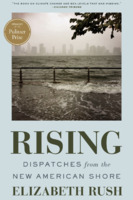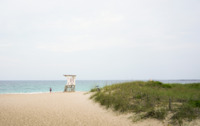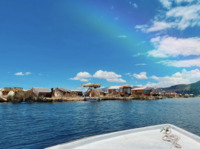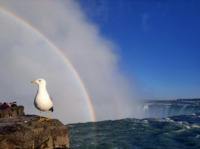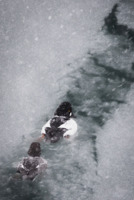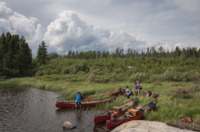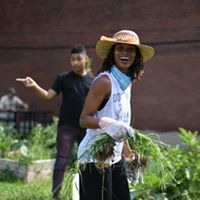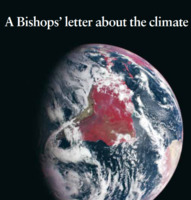Search
78 items
-
Water Issues in Appalachia
Some people may think that water issues in the United States only exist in the west. This is far from the truth. In addition to algae bloom issues throughout the midwest, the Appalachian region of the United States has been experiencing severe water contamination due to mining and chemical spills for the past several years. Fortunately, the residents of this region are kept informed by the Catholic Committee of Appalachia. Once a year, residents from all over the state meet in one location to discuss the issues of their region and try to come up with solutions. -
The Sacredness of Water
This chapter from the student-written book “Emerging Perspectives on Religion and Environmental Values in America” explores the importance of water across religious traditions and modern life. It explores the importance of water for survival but also as a gift that frequently acts as a spiritual symbol. Below is the first paragraph of the chapter to introduce the discussion.
"Pick up any religious text and you are likely to find at least one reference to water. Whether it is used to cleanse, bathe, heal, restore, replenish, or purify: water is one of the most prolific symbols in major world religions, stretching through time, place, and culture. As human beings, this may come as no surprise seeing how our bodies are composed mostly of water, and we rely on it for our very survival – a truth that continues to become more resonant as the effects of climate change take hold in the forms of drought, rising temperatures, and natural disasters. Like many religious symbols, water appears in scripture, ritual and tradition through its simplicity and use in everyday life. In examining a variety of major world religions, namely Islam, Judaism, Hinduism and Christianity, connections between water as a common resource, and water as a sacred and holy gift become apparent. Drawing from these unique and similar understandings of water, we can begin to consider the spiritual motivations one might have in engaging in water conservation efforts. Furthermore, in exploring these religions specifically, we can identify some beliefs about water that may provide helpful wisdom in the face of more rational conversations surrounding water conservation. Because these religions have such strong relationships with water and large followings worldwide, there is hope that these connections between scripture and our contemporary crisis may be brought to life to move toward a more secure and just future." -
Scripture Sunday: Invitation to the Thirsty
"Walter Bruggeman has said that the task of the prophet is 'to nurture, nourish, and evoke a consciousness and perception alternative to the consciousness and perception of the dominant culture around us.' Here in Deutero-Isaiah, the Israelites who have been exiled are given a vision of hope, Isaiah is evoking a reality far different from what they know. In the previous chapter, God says, in one of my favorite verses, 'For a brief moment I abandoned you, but with deep compassion I will bring you back. In a surge of anger I hid my face from you for a moment, but with everlasting kindness I will have compassion on you… My unfailing love for you will not be shaken nor my covenant of peace be removed' (Isaiah 54:7-10). This is the climax of the second book of Isaiah, that God’s anger towards injustice and the consequences of it are momentary, but God’s compassion, love, and faithfulness are everlasting, something we can never be separated from. Isaiah 55 then flows into the specifics of that love. God’s invitation into divine care is one that freely gives water, food, and rest." -
A Bluer Theology: Protecting and Restoring God’s Marine Creation
"Blue Theology was founded in 2008 by Rev. Dan Paul and Rev. Deborah Streeter. Streeter coined the term “Blue Theology” as a theological approach that weaves together marine biology and Christian theology. Over the next few years, the Church, only blocks from the Pacific Ocean, began hosting weeklong groups to engage in learning-serving experiences with God’s marine creation. Over the last two years, Blue Theology Outposts have opened in Newport Beach, CA, Texas City, TX, and Beaufort, NC. The mission of the Blue Theology program is to provide learning and serving experiences in ocean conservation while fostering heart connections to the sea." -
Sacred Lands, Sacred Waters: Theological Reflections on This Sacred World
"The lands and waters of this world are sacred places. We know it when we rest in them and we know it from our sacred texts. As Christians, to see the world as creation is to see the world as sacred.
This resource includes theological reflections from Karyn Bigelow, Avery Lamb, Dr. Miguel A. de la Torre, Rev. Victoria Loorz, Rev. Dan Paul, and Rev. Dr. Randy Woodley.
This resource was originally published for Season of Creation 2022." -
Laudato Si’ -- On Care For Our Common Home
Laudato Si appears to be increasing interactions between environmental professionals and faith communities, and as such, is a very important document for all people to understand–not just Catholics! Roman Catholicism is the largest religious denomination in the world (1.2 billion). An encyclical is one of the most authoritative declarations that a Pope can put forth. Laudato Si is both a reflection of the larger moral and religious landscape of environmental values, and perhaps simply the most prominent such statement of values yet crafted. It is symbolic of this moment in time when religious and ethical voices are gaining currency in environmental thinking, regardless of any particular doctrine.
-
From the Ground Up: An Adult Outdoor Education Program
AKA Our Deen is Green! for Adults"We are happy to announce that applications are now being accepted for From the Ground Up: An Adult Outdoor Education Program (aka Our Deen is Green! for adults). This special program, funded by a grant from the National Park Service Chesapeake Gateways Office, will begin after Ramadan, in late April 2024, and continue into spring of 2025. It is a unique opportunity to become immersed in the various facets of ecology, environmental science, sustainability and stewardship. It will include monthly classes, mostly in-person and outdoors in parks and wildlife sanctuaries in DC, Maryland, and Northern Virginia, focused on specific aspects of and issues pertaining to our local region, the Chesapeake Bay Watershed.
Classes will be led by local subject matter experts and include a variety of topics, including local plants and animals, the interconnectedness of our watershed, the challenges it’s facing, and what we can do to help. Specific classes will include:
· An introduction to the Chesapeake Bay Watershed
· Local herps: reptiles and amphibians
· Monitoring stream health with benthic macroinvertebrates
· Stream restoration and invasive plant removal
· The importance of native plants and pollinator gardens
· Watershed education through an interfaith lens
· Native trees
· Soil health
· Environmental justice
· Local birds and “bugs”
· Solar power and clean energy
· Sustainable living
· Water-quality monitoring
· And more!
We are looking for 10-15 strongly committed local residents who are interested in learning about our local watershed, its needs, and what they can do to help it. Participants will be encouraged to create a long-term project or plan of action describing something they will do to support the watershed and/or encourage their families or communities to pay more attention to environmental issues.
Program participants must be able to commit to the majority of the monthly classes. All in-person classes will take place on weekends and last 2 to 4 hours. (We will do our best to help provide transportation if necessary.)
This entire program is being offered free of charge thanks to a National Park Service Chesapeake Gateways grant. The National Park Service Chesapeake Gateways Office (NPS Chesapeake Gateways) offers competitive grant opportunities to advance the Chesapeake Bay Initiative Act of 1998 within the full 41-million-acre Chesapeake Bay watershed. Chesapeake Gateways grants bring out familiar, untold, under-appreciated, or yet to be uncovered narratives and promote resilient communities & landscapes through tourism, sustainability, conservation & local economies throughout the Chesapeake Bay watershed.
The program begins after Ramadan, with the introductory class set for April 21st! Applications are due by March 8th. Access the application form below. Please reach out to us at contact@greenmuslims.org with any questions." -
Rising: Dispatches from the New American Shore
This resource contains a series of vignettes following Elizabeth Rush as she meets people all around American who have been affected in some way by global sea rising, as well as some of her own personal experiences. She gives voice to those otherwise not heard, and shares eye opening testimonials from those who experience the effects firsthand. -
A Walk with Sustainability…and the Bolivian Llamas
"In this picture, I am working alongside two rural Bolivian community members (and a llama), collaborating on the design of a water system. The community had no running water, phone service only on hills, cut plastic liter bottles in half for gutters, and still gave me soups and meals as a welcoming and thankfulness. Their kindness, harmony with the land around them, and joy radiated, deeply resonating with my idea of how to live a sustainable, happy life. Sustainability is not buying a reusable water bottle…every 3 months because a new, better, more cool version is here. It is living in gratitude and simplicity with the people and nature around you." Taken by Megan Oleksik. Submitted to the RESTORExchange Sustainability Contest. -
Capturing the Essence of Sustainability at Halifax Public Garden
"Capturing the essence of sustainability at Halifax Public Garden. This picturesque view of the tranquil lake connects the myriad benefits of green spaces, from promoting social connections and mental well-being to enhancing physical health and fostering equity within our communities to improving water and air quality. Serving as a reminder of the crucial role green spaces play in fostering sustainable communities. By preserving and nurturing our natural environments, we not only enhance our quality of life but also safeguard the health of our planet for future generations. Let's continue to embrace and support sustainability efforts for a greener, more resilient world." Taken by Aklema Iryn. Submitted to the RESTORExchange Sustainability Photo Contest. -
Friends Enjoying the Beach During the Off Season
"Friends enjoying the beach during the off season. The sound of crashing waves creates a feeling of serenity and reminds us how important it is to protect the ocean." Taken by Hailey Irving. Submitted to the RESTORExchange Sustainability Photo Contest. -
Uros
"This photo captures a moment with Rueben, our gracious host during my stay with the Uros community on Lake Titicaca. He took us on a tour, sharing stories about his culture. The Uros, residing on the Floating Islands, have thrived on the water for over two millennia. Their unique way of life emerged from a deep understanding of the reed plants found in the lake. They discovered a species that naturally floats with its soil and roots, enabling them to construct foundations and structures in the midst of Lake Titicaca, the largest fresh water lake in South America. Initially, this innovation served as a refuge from their land enemies. Remarkably, during the Spanish invasion, the Uros survived by ferrying the Spanish across the lake, avoiding conflict. These floating islands, crafted from living reed plant architecture, epitomize the collaboration between humans and nature. The plants never would have grown in such density and formed islands without the Uros people. Rueben’s family made us amazing food. Their kids saw us as larger-sized children and played with us. Rueben emphasized how the Uros people never lived beyond their means and how it’s their generational ethos to take from nature only what they need. Today, the majority of homes on these floating islands run entirely on solar energy. Witnessing communities like theirs make conscientious choices in designing their lives for the betterment of future generations left me feeling hopeful yet unsettled, as their life stands in stark contrast with the culture of excessive consumption in the society I inhabit." Taken by Erica Hu. Submited to the RESTORExchange Sustainability Photo Contest. -
Sustainability is Beautiful
Second Place Winner of the Sustainability Photo Contest.
"I am enthusiastic person about sustainability and i have my Start-up with main focus on sustainability. I have taken this photo at Niagara falls month ago as college trip. Photo itself shows how beautiful nature is. Sustainability is balance of life and nature. As photo shows a Common gull passionately watching people and not afraid of them. Background describe beauty of nature water, rainbow and clouds." Taken by Chaitnyakumar Makwana. Submitted to the RESTORExchange Sustainability Photo Contest. -
Ice and Teeming Wildlife
"May the future have ice and teeming wildlife". Taken by Diego Norena. Submitted to the RESTORExchange Sustainability Photo Contest. -
Paddling with a purpose
"Paddling with a purpose: The future deserves a sustainable world". Taken by Diego Norena. Submitted to the RESTORExchange Sustainability Photo Contest. -
God’s Creation Waits
This document is a children's activity book. It discusses topics of different species and environments, showing the importance of each part of our world and connecting it to Christian teachings and values. This includes activities such as crosswords, coloring pages, and much more. -
How Religion Influences Our Relationship With the Environment
The article shows how religious change can effect trends in the environment and how it can produce better environmental conditions attitudes. It lists statistics on which countries have certain environmental issues and how religion may play a role in certain situations. -
Engaged Organizations: General Board of Global Ministries
General Board of Global Ministries discuss their vision and span of their work on their website. Their areas of impact run the gamut for a multitude of environmental and social justice issues:
"Connection is at the core of our work. Global Ministries connects The United Methodist Church, its people and congregations to partner with others engaged in God’s global work, which takes place in a variety of settings, countries and cultures.
Global Ministries works through missionaries and partners in more than 60 countries around the world. " -
Engaged Organizations: A Rocha International
A Rocha International discuss their mission on their website:
"At A Rocha USA, our mission is to restore both people and places through collaborative, community-based conservation.
We resource Christians to care for creation where they live by building a network of hands-on conservation projects in communities across the nation. Through partnerships with individuals, churches, and community groups, we provide content, curriculum, and a network of support for improving local habitats and increasing biodiversity." -
Engaged Organizations: Columban Center for Advocacy and Outreach
Columban Center for Advocacy and Outreach serves as a line of communication between Columban missionaries and policy makers in Washington D.C. Missionaries are stationed in 16 countries around the world, bringing attention to environmental justice issues that are most pressing for marginalized populations in the areas. Their primary focus is combating human-induced climate change. In addition, they advocate for sustainable development and agricultural systems, and right to clean water. -
Engaged Organizations: National Council of Catholic Women
National Council of Catholic Women discuss their work with Catholic Relief Services with regard to their focus on water projects in developing countries, as indicated on their website and in the video below:
"The Water for Life video illustrates the work of Catholic Relief Services in partnership with the National Council of Catholic Women (www.nccw.org) in responding to the critical need for water projects in developing countries. The greatest humanitarian crisis in the world today is food and water scarcity issues that threaten the peace and security of most developing nations." -
Hindu Ecology
Among other philosophical beliefs of Hinduism, adherents advocate for the sacredness of all life forms, simple living, and inner peace. This Hindu statement on ecology, compiled and edited by Ranchor Prime and published by the World Bank in 2003, is posted on the website for Interfaith Center for Sustainable Development: -
Global Climate Change A Plea for Dialogue Prudence and the Common Good
A Statement of the United States Conference of Catholic Bishops was issued on June 15, 2001. This document covers a multitude of current environmental problems and the resulting negative impact on populations around the world - especially with regard to indigent populations. It stressed the connectivity of human behavior and it's impact on the planet. -
Keynote Address by His All-Holiness Ecumenical Patriarch Bartholomew at the Arctic Circle Assembly
Ecumenical Patriarch Bartholomew I of Constantinople addressed the Arctic Circle Assembly in Reykjavik, October 13, 2017. Below is a section of the keynote address, focusing on the impact of climate change with regard to the Arctic Circle:
"Scientists tell us that the Arctic is a vibrant image and vivid mirror of the state of our planet as a whole. For scientists, the Arctic is the barometer of the globe's environmental health. The ecological misdeeds committed in other regions – including chemical contamination and nuclear radiation – are clearly evident in the Arctic environment. Above all, the dramatic rise in global temperatures is having a palpable effect on the Arctic landscape. Nevertheless, so many industrial societies and activities that cause climate change are often blind to the consequences of their behavior. But here, in the Arctic Circle, it is possible to see all manner of things so much more clearly. When we visit this pristine part of the planet, we cannot hide our eyes, either from the beauty of God’s creation or from the changes which human folly has generated. Nor can we avoid pondering the terrible consequences for the remainder – and the future – of the world, if glaciers continue to melt and sea-levels continue to rise." -
A Bishops’ Letter about the Climate
Below is a section of the introduction from A Bishops’ Letter about the Climate, which covers a multitude of critical environmental issues, from the 2014 Bishops' conference:
"We have lived with reports and forecasts of climate change since the 1980s. Our climate is the result of the interaction of complex systems and there is often a great distance between cause and effect in terms of both space and time. There are uncertainties and a lack of clarity. However, the knowledge we possess today does not allow us to postpone until tomorrow
what needs to be done now. Our human climate impact must decrease for the sake of the earth, for the sake of the world that God so loves that God gave us Jesus Christ."






